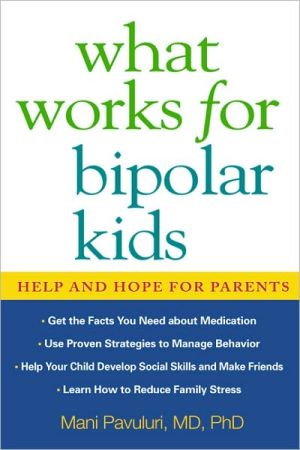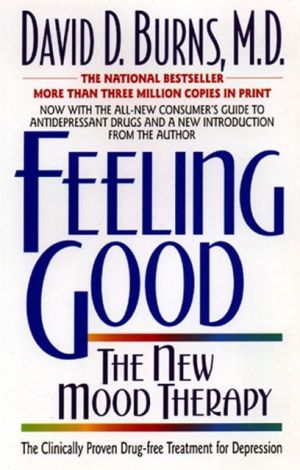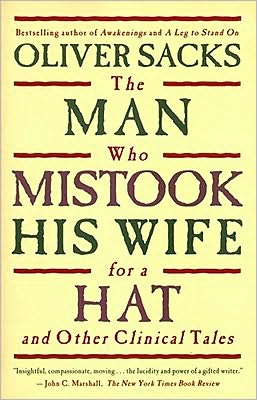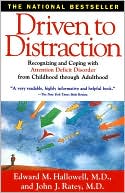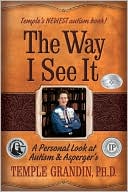What Works for Bipolar Kids: Help and Hope for Parents
It may be hard to believe your child will ever get better, but kids with bipolar disorder can and do lead healthy, stable lives. In this compassionate and optimistic book, expert clinician and renowned researcher Mani Pavuluri delivers information, advice, and proven strategies that empower you to deal with the challenges of bipolar disorder and help your child get well. Drawing on 20 years of experience with bipolar kids and their families, she provides solidly researched strategies for...
Search in google:
It may be hard to believe your child will ever get better, but kids with bipolar disorder can and do lead healthy, stable lives. In this compassionate and optimistic book, expert clinician and renowned researcher Mani Pavuluri delivers information, advice, and proven strategies that empower you to deal with the challenges of bipolar disorder and help your child get well. Drawing on 20 years of experience with bipolar kids and their families, she provides solidly researched strategies for reducing or eliminating problems with mania, aggression, sleep disturbances, depression, and other issues. You’ll discover practical ways to handle crises at home and in school, work with professionals to find an effective combination of medicine and psychotherapy, and cultivate a supportive community of friends and peers for your child. Dr. Pavuluri also helps you deal with the stress that comes with parenting, so you can maintain your poise, focus on the positive, and be a powerful advocate for your child. Doody Review Services Reviewer:Arshdeep S. Jawandha, MBBS(Rush University Medical Center)Description:This compilation of advice for parents and caregivers of children with bipolar disorder is organized in three parts. Broadly, part I deals with basic questions parents might have. Part II provides the much needed, comprehensive psychoeducation that all parents will need, both at the time of diagnosis and on an ongoing basis. Part III provides advice about specific situations that might arise with children in relation to school or healthcare providers. The advice, however, is scattered throughout the book.Purpose:This book provides information about bipolar illness, its treatment, problems encountered along the way, and possible solutions in simple and easy to comprehend terms.Audience:The author intends this book for parents and caregivers of children with bipolar disorder, as well as youth with bipolar disorder. However, this is also a good sourcebook for psychiatry, psychology, or social work trainees who can pick up advice that they can offer clients in various crisis situations.Features:Basic information about diagnosis, methods of evaluation, and a variety of treatment options is provided. Descriptive tables detail common clinical terms related to bipolar disorder and various degrees, clinical titles, and roles that health professionals play, thus helping parents demystify the healthcare provider system. Some common questions, such as the role of heredity, parenting styles, etc., are nicely addressed. Advice for parents on how to handle crisis situations is included, while the need to maintain a good parent-child relationship is strongly emphasized, along with simple ways to achieve this. The subject of medications, side effects, risks of stopping suddenly, and lack of compliance are discussed. The book also addresses the very important topic of how parents must modify their own expectations and enhance self care as they care for their sick children. There is a clear cataloging of alternative treatments as well as the bogus treatments. A unique RAINBOW approach is discussed and information about child and family centered therapy is included, along with methods for, and the importance of, teaching children social skills. Methods of engagement with doctors and school are outlined, educating parents about the terminology used in the various areas, which in itself will help reduce parents' anxiety. At the very end are appendixes that help parents quickly revisit the basic principles of care of children with bipolar disorder, mania rating scales, lists of medications and side effects, and a nice compilation of a framework for a school teleconference. All of these resources can be quickly accessed as needed after the book has been read and shelved.Assessment:Though it will be read only by motivated parents and some of the terminology may be hard for parents to follow, overall this book will help readers become informed consumers of healthcare services and empower parents of children with bipolar disorder.
Foreword viiAcknowledgments xiIntroduction: Helping Your Bipolar Child: A Fresh Outlook 1The Facts and Fundamentals: Knowing the PlaygroundYes, Bipolar Disorder Does Occur in Children 13Does My Child Really Have Bipolar Disorder? 29Finding the Right Doctor and Treatment Team 48Treatment That Can Help Your Child and Your Family: Finding the SolutionsSetting the Stage to Make the Most of Treatment: Principles to Get You Off to a Good Start 73Managing Your Child's Moods with Medication 81Making Life Better with RAINBOW Therapy 114Parenting with Poise: The Secret Ingredient for Success 142Pulling It All Together into Strategies for Specific Situations: Wisdom That Gets You CenteredKeeping the Peace at Home 163Finding the Best School Setting and Programs for Your Child 190Forming a Partnership with Your Child's Teacher 211Building Social Skills for Positive Friendships 221Epilogue: A Final Word 233AppendicesPrinciples for Meeting the Challenge of Bipolar Disorder 239Child Mania Rating Scale-Parent Version (CMRS-P) 240Child Mania Rating Scale-Teacher Version (CMRS-T) 242Medication: Tracking theHistory of Response 244Pediatric Side Effects Checklist (P-SEC) 246Medications Used for Bipolar Disorder in Children 249Daily Mood Calendar 252Framework for a Physician-School Teleconference 253Resources 257Bibliography 261Index 265About the Author 274
\ From The CriticsReviewer: Arshdeep S. Jawandha, MBBS(Rush University Medical Center)\ Description: This compilation of advice for parents and caregivers of children with bipolar disorder is organized in three parts. Broadly, part I deals with basic questions parents might have. Part II provides the much needed, comprehensive psychoeducation that all parents will need, both at the time of diagnosis and on an ongoing basis. Part III provides advice about specific situations that might arise with children in relation to school or healthcare providers. The advice, however, is scattered throughout the book.\ Purpose: This book provides information about bipolar illness, its treatment, problems encountered along the way, and possible solutions in simple and easy to comprehend terms.\ Audience: The author intends this book for parents and caregivers of children with bipolar disorder, as well as youth with bipolar disorder. However, this is also a good sourcebook for psychiatry, psychology, or social work trainees who can pick up advice that they can offer clients in various crisis situations.\ Features: Basic information about diagnosis, methods of evaluation, and a variety of treatment options is provided. Descriptive tables detail common clinical terms related to bipolar disorder and various degrees, clinical titles, and roles that health professionals play, thus helping parents demystify the healthcare provider system. Some common questions, such as the role of heredity, parenting styles, etc., are nicely addressed. Advice for parents on how to handle crisis situations is included, while the need to maintain a good parent-child relationship is strongly emphasized, along with simple ways to achieve this. The subject of medications, side effects, risks of stopping suddenly, and lack of compliance are discussed. The book also addresses the very important topic of how parents must modify their own expectations and enhance self care as they care for their sick children. There is a clear cataloging of alternative treatments as well as the bogus treatments. A unique RAINBOW approach is discussed and information about child and family centered therapy is included, along with methods for, and the importance of, teaching children social skills. Methods of engagement with doctors and school are outlined, educating parents about the terminology used in the various areas, which in itself will help reduce parents' anxiety. At the very end are appendixes that help parents quickly revisit the basic principles of care of children with bipolar disorder, mania rating scales, lists of medications and side effects, and a nice compilation of a framework for a school teleconference. All of these resources can be quickly accessed as needed after the book has been read and shelved.\ Assessment: Though it will be read only by motivated parents and some of the terminology may be hard for parents to follow, overall this book will help readers become informed consumers of healthcare services and empower parents of children with bipolar disorder.\ \ \ \ \ From the Publisher"Finally, a book about pediatric bipolar disorder that really gets it right, offering help and hope where so much misinformation and misunderstanding have interfered with parents' getting the best for their child. Given all the confusion about diagnosis and treatment, Dr. Pavuluri's book is a godsend for parents. Her writing is warm and welcoming, and her practical wisdom and common sense leap off the page."--Peter S. Jensen, MD, Director, The REACH Institute\ "The approach in this book has helped me achieve new stability for my son. For parents in search of help, this book will become your compass for all that lies ahead. Dr. Pavuluri’s expertise, passion, and tireless effort shine through on every page. She provides excellent information on how to manage bipolar disorder, choose and communicate with care providers, and advocate for your child in the school and health insurance arenas. The book is refreshing in its overarching sense of optimism, empathy, and support."--J. McCarthy, parent\ "It's as if Dr. Pavuluri wrote this book for me and my family! Reading it gave me a better understanding of why my son with bipolar disorder acts the way he does, together with tools to help alleviate his pain. Throughout, Dr. Pavuluri demonstrates her understanding of these children's feelings and provides invaluable explanations and resources. This book shows parents like me that we are not alone. It is truly inspirational, and has given me new hope for my son."--Laurie P., parent\ "Dr. Pavuluri speaks frankly to parents, but with a comforting wisdom. She compares treatment to building a house--medication management is the foundation, psychological counseling provides the bricks, and family therapy is the cement that holds it all together. This book provides a useful and encouraging blueprint."--Gabrielle A. Carlson, MD, Director, Child and Adolescent Psychiatry, Stony Brook University School of Medicine\ "Dr. Pavuluri has seen it all--the stress on families, the frustrations in finding the right medications, the battles for support in school. This book will be a major help as you strive to make sense of your child's symptoms and the many different treatment recommendations you may receive."--David J. Miklowitz, PhD, author of The Bipolar Disorder Survival Guide\ \ \ \ Metapsychology Online Reviews"The book contains a wealth of resources, and sheds light on appropriate parenting skills, effective relationships with the child's school, types of clinicians, available medications, and much more. What Works for Bipolar Kids is a very helpful resource for parents, and is also a good addition to the mental health clinician's list of recommended books on the topic."--Metapsychology Online Reviews\ \
